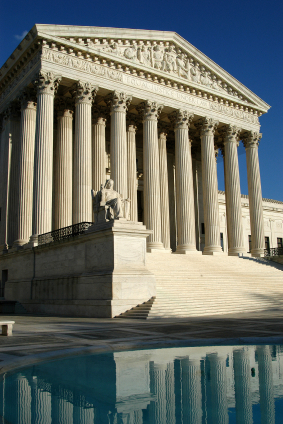In Argument in Abercrombie & Fitch Case, Court Offers Solutions for Headscarf Issue

Yesterday, the Supreme Court heard argument in the religious discrimination case of EEOC v. Abercrombie & Fitch Stores, Inc., which made our list as one of our five issues to watch for 2015. The case arises under Title VII, the federal law that makes it illegal for an employer “to discriminate against any individual with respect to h[er] compensation, terms, conditions, or privileges of employment, because of such individual’s . . . religion.” The EEOC alleges that Abercrombie, purveyor of “authentic American clothing,” discriminated against Samantha Elauf on religious grounds. The company refused to hire Elauf because she wore a headscarf, or hijab, to her job interview, and the company’s “Look Policy” prohibited employees from wearing “caps.”
In earlier depositions in the case, Elauf’s interviewer at Abercrombie testified that she “assumed that [Elauf] was Muslim,” and “figured that was the religious reason why she wore her head scarf.” The interviewer said that she went to her district manager to discuss the headscarf issue, and told him that “[Elauf] wears the head scarf for religious reasons, I believe.” The interviewer testified that the district manager then told her not to hire Elauf because of the headscarf and said, “[S]omeone can come in and paint themselves green and say they were doing it for religious reasons, and we can’t hire them.” As a result, the interviewer lowered Elauf’s “appearance” score on her evaluation, and Elauf didn’t get the job.
Despite this testimony, the Tenth Circuit still entered summary judgment for Abercrombie, holding that the EEOC’s discrimination claim could not proceed to trial because Elauf “never informed Abercrombie prior to its hiring decision that she wore her headscarf or ‘hijab’ for religious reasons and that she needed an accommodation for that practice, due to a conflict between the practice and Abercrombie’s clothing policy.”
The fact that the Tenth Circuit granted summary judgment, even though the interviewer admitted that she assumed that Elauf wore the scarf for religious reasons, helps explain the concerns, and potential solutions, that the Justices raised in yesterday’s argument.
For example, Justice Ginsburg asked whether Elauf knew there was a “Look Policy” that would preclude her from wearing her headscarf, absent an accommodation, and was told that Elauf did not know. Rather, before the interview, Elauf's friend who worked at Abercrombie told her that she could wear a scarf so long as it wasn’t black. Yet the Tenth Circuit still believed that the duty fell on Elauf to request an accommodation, because the scarf in and of itself would not notify Abercrombie that Elauf felt religiously obligated to wear it.
Abercrombie’s lawyer raised concerns about the impact that a contrary legal regime could have for employers. If an employee is not required to provide notice of a need for a religious accommodation, he said, then employers will have a duty to accommodate for unknown religious beliefs, and will need to comply with that duty by sterotyping about beliefs and asking specific questions about them. Justice Kagan, however, said that while this might be an “awkward conversation,” Abercrombie was advocating an alternative rule under which it could “stereotype people and prevent them from getting jobs.”
In response to a hypothetical involving someone who has a beard and interviews for a job at which no facial hair is permitted, Justices Alito and Sotomayor each provided a suggestion that might avoid the “awkward conversation.” They suggested that employers could simply say, “We have a policy that our employees cannot have facial hair. Do you have a problem with that?” But this solution might not be so desirable for potential employees; in a job interview, it’s not so easy for an applicant to say that he or she has a problem with a workplace policy.
Perhaps it will be an easier solution for the Court to simply say that an employer violates the law when it assumes that the employee has a religious belief and discriminates based on that assumption. In the oral argument, no one questioned that it’s illegal to refuse to hire a person named Mel Goldberg based on the assumption that he is Jewish. Is it less discriminatory for an employer to refuse to hire someone who wears a headscarf because it assumes the potential employee won’t comply with a policy against headwear for religious reasons, rather than because it doesn't like Muslims? Abercrombie certainly took that position, because it sought to distinguish between an assumption about non-compliance with policy and an assumption that leads to action based on animus. But at least some members of the Court seemed ready to unravel that distinction and find that Abercrombie wrongfully discriminated against Elauf when it denied her a job based on its assumption about her religion, regardless of what motivated its decision.
Information provided on InsightZS should not be considered legal advice and expressed views are those of the authors alone. Readers should seek specific legal guidance before acting in any particular circumstance.
As the regulatory and business environments in which our clients operate grow increasingly complex, we identify and offer perspectives on significant legal developments affecting businesses, organizations, and individuals. Each post aims to address timely issues and trends by evaluating impactful decisions, sharing observations of key enforcement changes, or distilling best practices drawn from experience. InsightZS also features personal interest pieces about the impact of our legal work in our communities and about associate life at Zuckerman Spaeder.
Information provided on InsightZS should not be considered legal advice and expressed views are those of the authors alone. Readers should seek specific legal guidance before acting in any particular circumstance.




